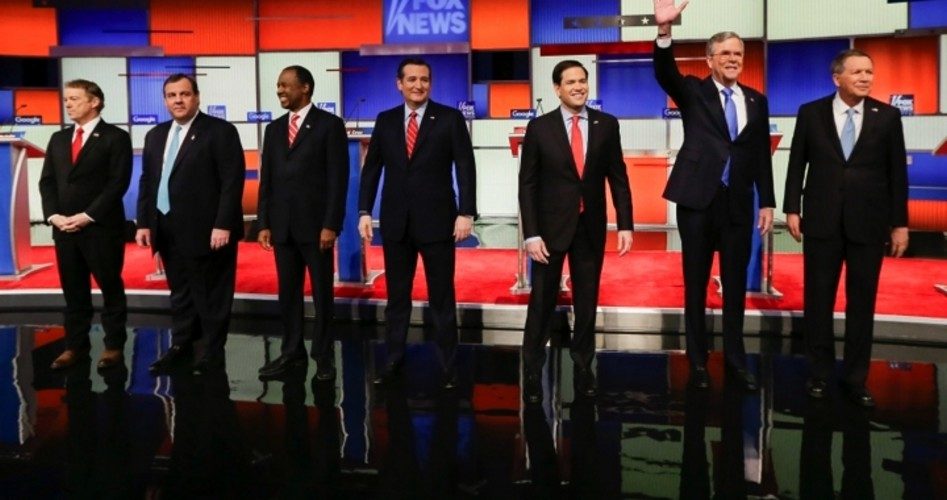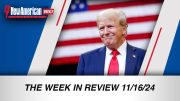
In the seventh Republican candidate’s debate of the 2016 presidential campaign season, held in Des Moines, Iowa, on January 28, the seven candidates on stage fought to take advantage of Donald Trump’s absence to get their message across. After an ongoing public feud with the Fox News Network, which hosted the debate, during which Trump complained that debate moderator Megyn Kelly had treated him “unfairly,” Trump’s campaign issued a statement two days before the debate notifying the press and public that he would not be participating in the event.
Despite his allegations of unfair treatment, Trump had often received more speaking time during the debates than any other candidate. However, former Hewlett-Packard CEO Carly Fiorina, who did not make the cut to be included in last night’s debate, actually received the most speaking time during last October’s debate, with Trump coming in fourth.
Moderator Kelly kicked things off by saying she wanted to “address the elephant not in the room tonight,” asking Senator Ted Cruz (R-Texas) what message Trump’s absence sent sends to the voters of Iowa.
Cruz responded humorously by mimicking Trump: “I’m a maniac and everyone on this stage is stupid, fat, and ugly. And Ben [Carson], you’re a terrible surgeon.
{modulepos inner_text_ad}
Kelly noted that, earlier in the campaign, Cruz had praised Trump as someone he thought was an effective voice against the Washington cartel, but “when he started to criticize you, your message changed, and you suddenly started to portray him as the voice of the Washington cartel, and suggested he would do the Democrats’ bidding. Which is it?”
Cruz replied:
Well, let me be clear, if Donald engages in insults or anybody else, I don’t intend to reciprocate. I have not insulted Donald personally and I don’t intend to. I am glad Donald is running. I’m glad he has produced enormous enthusiasm, and, every Donald Trump voter or potential voter, I hope to earn your support. I know everyone else on this stage hopes to earn your support.
When moderator Chris Wallace asked Senator Marco Rubio (R-Fla.) how he would accomplish his promise to unite all of the factions inside the Republican Party, Rubio replied:
Let’s begin by being clear what this campaign is about. It’s not about Donald Trump. He’s an entertaining guy. He’s the greatest show on earth. This campaign is about the greatest country in the world and a president who has systematically destroyed many of the things that made America special.
You see, we usually elect presidents in America that want to change the things that are wrong in America. Barack Obama wants to change America. Barack Obama wants America to be more like the rest of the world. We don’t want to be like the rest of the world. We want to be the United States of America.
Those two questions would set a pattern for the debate, with Rubio and Cruz getting the most speaking time of all the candidates. Rubio received 13 minutes, 31 seconds; Cruz 13 minutes, 11 seconds; former Florida Governor Jeb Bush, nine minutes, 24 seconds; Ohio Governor John Kasich, eight minutes, 52 seconds; New Jersey Governor Chris Christie, eight minutes, 22 seconds; retired neurosurgeon Ben Carson, six minutes, 11 seconds; and Senator Rand Paul (R-Ky.) seven minutes, 56 seconds. Paul has typically received the least, or nearly the least, time in the previous debates.
During a discussion about what made a candidate a member of the “establishment” that started when moderator Bret Baier told Bush that it is hard for anyone of his pedigree to avoid being called establishment, Baier asked Bush,
Isn’t that part of the problem in this race, that three others on this stage are splitting the main stream Republican vote and thereby possibly handing this nomination over to an anti-establishment candidate?
By an anti-establishment candidate, Baier presumably meant Trump. Bush employed a little humor by saying, “I kind of miss Donald Trump. He was a little teddy bear to me” — a comment that generated a round of laughter.
However, Bush frankly admitted that having a father and brother who preceded him in the White House made him part of the establishment before stating:
But this election is not about our pedigree, this is an election about people that are really hurting. We need a leader that will fix things and have a proven record to do it. And we need someone who will take on Hillary Clinton in November. Someone who has a proven record, who has been tested, who is totally transparent. I released 34 years of tax returns … and 300,000 e-mails in my government record. To get the information from Hillary Clinton, you need to get a subpoena from the FBI.
When asked to address the subject of “establishment,” Christie painted a picture of a hypothetical 45-year-old construction worker who is having a hard time making things meet because he’s lost $4,000 a year of his income over the last seven years because of the Obama administration. Of this worker, Christie said:
He doesn’t want to hear the talk about politics, Megyn, and who is establishment and who is grassroots. And who’s compromised and who is principled. What he wants is something to get done.
Baier then addressed Paul stating the obvious (but often ignored) fact: “Senator Paul, you are definitely not in the establishment category.” Baier then proceed ask Paul:
At the beginning of this campaign, you said you were your own man when asked about your father, former Texas Congressman and three-time presidential candidate Ron Paul. Senator Cruz’s campaign is out with a video saying that Cruz is the intellectual and political heir to your father’s 2012 campaign and the liberty movement. And your father now says it’s realistic that Donald Trump will be your party’s nominee. So did you make a mistake by not fully — more fully embracing your father politically at the beginning of this campaign?
Paul replied:
There’s probably no person I respect more in the country or in recent history than my father. I think he was probably the most honest man in politics that we’ve ever seen in a generation.
And so in no way have I ever said that I don’t embrace my father or love my father or appreciate everything that he has done for the country. I think what’s interesting about where that liberty vote goes that my father brought to the Republican Party is, I don’t think they’re necessarily going to go for Ted.
You know, Ted didn’t show up. We had an audit-the-Fed vote, which was the biggest thing my dad had been advocating for, for 30 years. Ted didn’t have time to show up. He was the only Republican that didn’t show up for it.
And so I think really that [liberty ] vote is going to stay in the Paul household. I think more of it is coming and it’s going to grow.
The confrontational mood that seemed to prevail during much of past debates seem to soften this time around, as Rubio, the next speaker, had kind words to say about Paul:
I think, you know, Rand and I have some significant issues on policy, but I respect Rand. He believes everything he stands for.
(APPLAUSE)
I do respect Rand.
Then came the unspoken, “but.” Much like Christie, Rubio went on to talk about how he would defeat ISIS and protect America from terrorism. Part of his plan touched on the controversial gathering of intelligence (though Rubio did not specifically mentioned the NSA), something that Paul and Chrstie have locked horns over in past debates. Said Rubio:
That’s why when I’m president we are going to rebuild our intelligence capabilities. And they’re going to tell us where the terrorists are. And a rebuilt U.S. military is going to destroy these terrorists.
Paul said, in response:
The bulk collection of your phone data, the invasion of your privacy did not stop one terrorist attack. I don’t think you have to give up your liberty for a false sense of security.
When we look at this bulk collection, the court has looked at this. Even the court declared it to be illegal. If we want to collect the records of terrorists, let’s do it the old fashioned way. Let’s use the Fourth Amendment. Let’s put a name on a warrant, let’s ask a judge for it. Let’s respect the history of our country.
John Adams said that we fought a War for Independence because we wanted to fight against generalized warrants. Let’s don’t forget that.
Paul’s reference to not having to give up liberty for a false sense of security was a paraphrase of an often-quoted statement written by Benjamin Franklin on behalf of the Pennsylvania Assembly in its Reply to the Governor on November 11, 1755: “Those who would give up essential Liberty, to purchase a little temporary Safety, deserve neither Liberty nor Safety.”
A bit later, when Bush referred to his past criticism “of the Senators not giving the authorization for the use of military force,” Rubio reminded Bush that
… The authorization that Barack Obama asked for was not against ISIS. It was against Assad. And John Kerry described it as attacks that would be unbelievably small. I don’t think the United States should be engaged in symbolic military activity. So it was not against ISIS, it was against — it was against Assad.
When it was his turn to respond to the discussion about bombing ISIS in Syria, Paul said:
The issue in Syria’s a very important one, and it’s one we need to get right. The question is, should we be bombing both sides of the war? Some want to topple Assad. In fact, they want to bomb ISIS and Assad simultaneously.
I think that’s a really, really bad idea. In fact, I’ve said for several years that arming the allies of ISIS will make the situation worse, that what we really need to do is defeat ISIS.
But if you defeat Assad, what you will wind up with is a larger and more powerful ISIS that occupies that space. You might — you may well see an ISIS that takes over all of Syria.
That response not only outlined Paul’s views on intervening militarily in Syria, it also answered Baier’s earlier question about whether the candidate made a mistake by not fully embracing his father politically. Both Pauls — father and son — have been consistently noninterventionist on foreign policy.
Overall, the absence of Trump from the debate seemed to give the other candidates more time to expound on their views on a variety of issues without back-and-forth exchanges about Trump’s unrealistic proposals to ban all Muslims from entering the country or to build a wall across our southern border eating up time perhaps better spent on more substantive topics.
While the other higher ranking candidates were facing off at the Iowa Event Center in downtown Des Moines, Trump put on an event to benefit veterans three miles across town at Drake University. The event was attended by two other candidates for the Republican nomination who had appeared in the undercard debate earlier in the day, former Senator Rick Santorum (R-Pa.) and former Governor Mike Huckabee (R-Ark.). Trump said that the event raised six million dollars, one million of which was his own donation.
“I didn’t want to be here, I have to be honest,” Trump said at the event. “When you’re treated badly you have to stick up for your rights.”
During the event, Trump called out to Santorum and Huckabeee, who stood off to the side of the podium: “Hey fellas, come up here for a second.” “I’m going to stand over here,” Santorum said with a smile. “So I’m not photographed with the Trump sign.”
Photo: AP Images
Related articles:
Trump Will Skip Next Fox News Debate, Says He Knows “When to Walk Away”
Scaled-down Sixth Republican Debate Produces More Heat, Little Light
Denied Spot in Main Debate, Rand Paul Opts Out of “Undercard” Event
Underdogs Get Licks In During Fifth Republican Debate
Fourth Republican Debate: Feisty, Hilarious, Little Change in Polls
Leftist Bias (and Republican Stupidity) Exposed in Last Wednesday’s Debate
Republican Debate: Rubio, Cruz, Trump Rocked; CNBC Got Mocked
Rand Paul Accuses Jeb Bush of “Hypocrisy” for Marijuana Stand



